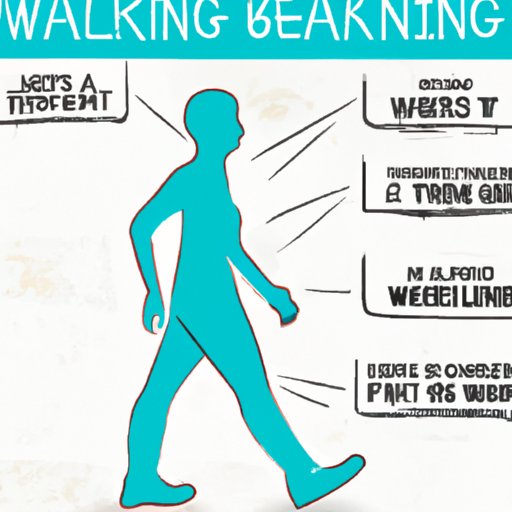Introduction
Weight loss can be a challenging journey for many individuals. There are various diets, exercise routines, and weight loss pills on the market, but which one is right for you? One of the most accessible and affordable ways to lose weight is by walking. This article will explore the benefits of walking for weight loss, tips, and tricks to maximize your steps, how far you should walk, and measuring progress.

Benefits of Walking: How Walking Can Help You Lose Weight
Walking, when combined with a healthy diet, is an effective way to lose weight. Walking increases your heart rate and helps your body burn calories, making it an excellent exercise for weight loss. Additionally, walking helps reduce stress, lower blood pressure, and boost energy levels, all of which contribute to weight loss. According to a study by Harvard researchers, individuals who walk regularly have a lower body mass index (BMI) and are physically healthier than those who do not.
Walking to Lose Weight: Tips and Tricks to Make Your Steps Count
Walking, like any exercise routine, requires discipline and consistency to be effective. To maximize the effectiveness of walking, try incorporating these tips and tricks:
- Improving walking posture- focus on keeping your back straight and shoulders relaxed.
- Increasing walking speed- try to walk at a brisk pace to increase heart rate and calorie burn.
- Form- make sure to land your heel on the ground first and then roll onto the ball of your foot to propel yourself forward.
How Far Should You Walk to Lose Weight: Finding the Right Balance
Walking distance is an important factor when it comes to weight loss. The optimal walking distance to lose weight depends on several factors such as age, weight, and the intensity of the walking. As a general rule of thumb, Begin by walking 30 minutes per day, five times per week. Over time, try to increase the time and distance you walk. If you are just starting, begin with a shorter distance and gradually increase your walking duration as your fitness improves.
Walking to Boost Your Metabolism: The Science Behind Losing Weight
The concept of a faster metabolism helps burn calories at a faster rate, and walking can effectively help boost metabolism. Walking increases metabolic rate, which allows the body to burn calories at a faster rate than usual. Consistent, regular walking can help increase metabolism, leading to weight and fat loss over time.
Walking vs. Running for Weight Loss: Which One is Better?
Walking and running are two popular forms of exercise for weight loss. Running burns more calories and is an effective way to lose weight. However, walking is more accessible and less dangerous than running, making it a better form of exercise for those who are new to exercise or have medical concerns.
Measuring Success: Tracking Your Steps and Weight Loss Progress
Tracking your progress is an ideal way to measure the effectiveness of your walking routine and stay motivated. You can track your daily steps using a pedometer or a fitness application on your smartphone. Additionally, you should weigh yourself regularly to track weight loss progress and make necessary changes to your walking routine if needed. Tracking progress will help you determine if your current routine is effective or if you should modify it.
Making It a Habit: Incorporating Walking into Your Daily Routine to Lose Weight
Walking for weight loss should be a part of your daily routine to be effective. An excellent way to incorporate walking into your daily routine is to create a schedule. Schedule a time for walking regularly, and try to stick to it to make walking a habit. Additionally, try to make walking enjoyable by listening to music, walking with a friend or a pet, or discovering new walking trails in your neighborhood.
Conclusion
Walking is an effective and affordable way to lose weight and improve overall health. By incorporating the tips and tricks listed above, tracking your progress, and making walking a habit, you will achieve a healthier lifestyle and weight loss goal. Remember, consistency and discipline are the key to success when it comes to incorporating walking into your daily routine.
